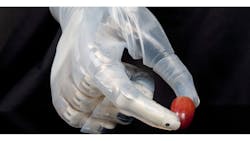Rockwell Automation Technology Will Help Manufacture Human Tissue, Organs
Regenerative medicine, according to the Mayo Clinic is a “game-changing area of medicine with the potential to fully heal damaged tissues and organs, offering solutions and hope for people who have conditions that today are beyond repair.
"Regenerative medicine itself isn't new — the first bone marrow and solid-organ transplants were done decades ago. But advances in developmental and cell biology, immunology, and other fields have unlocked new opportunities to refine existing regenerative therapies and develop novel ones.”
Some of the advances are taking place in the biomanufacturing process of human tissue and organs. In that vein, Rockwell Automation announced last week that it has been selected as a critical industrial automation partner in the Department of Defense’s new public-private Manufacturing USA initiative, the Advanced Regenerative Manufacturing Institute (ARMI).
“ARMI brings together advances in manufacturing, biotech, medicine and life sciences to create new possibilities for those with immediate need for human tissue and organs,” said Blake Moret, CEO of Rockwell Automation.
Federal funding of $80 million will be combined with $214 million of contributions from a prominent consortium, including $10 million from Rockwell Automation, to innovate mass production of tissue and organ biofabrication
ARMI is tasked with developing next-generation manufacturing techniques for repairing and replacing cells and tissues, which may one day lead to the ability to manufacture new skin for soldiers scarred from combat or develop organ-preserving technologies to benefit Americans stuck on organ transplant waiting lists.
The institute is focusing on solving the cross-cutting manufacturing challenges that stand in the way of producing new synthetic tissues and organs—such as improving the availability, reproducibility, accessibility, and standardization of manufacturing materials, technologies, and processes to create tissue and organ products. Leaders from a multitude of disciplines, from cell biology and bioengineering to materials science and computer modeling are collaborating under the institute's guiance. The partners are working to develop high-throughput culture and 3D biofabication techniques to non-invasive, real-time testing and sensing to measure the viability of engineered tissue constructs.
Industry partners include: Abbott, Autodesk, Becton Dickinson, Celularity, DEKA Research & Development, GenCure, Humacyte, Lonza, Medtronic, Rockwell Automation, and United Therapeutics
Government and non-profit organizations include: FIRST, the State of New Hampshire, and Manufacturing Extension Partnerships in multiple states
And Universities and other schools include: Arizona State University, Boston University, Cedars-Sinai Medical Center, Dartmouth College, Harvard University, Massachusetts Institute of Technology, Rutgers, Stanford University, the University of Florida, the University of Minnesota, the University of New Hampshire, Worcester Polytechnic Institute, and Yale University
“This is literally a life-changing approach and adds a new chapter to medicine,” said Moret. “Our contribution is to integrate biomanufacturing science with production techniques that increase the capacity, speed, modularity and consistent quality of new tissue and organ production. We are thrilled to have the opportunity to contribute our expertise to an initiative critical to the well-being of both civilians and service members.”
ARMI, which is the 12th Manufacturing USA institute is based in Manchester, New Hampshire, and integrates a diverse portfolio of industry practices and research to advance a robust biofabrication ecosystem.
Biofabrication is an innovative manufacturing industry segment at the intersection of biology-related research, computer science, materials science and engineering that creates innovations, such as biomaterial and cell processing.
The Advanced Tissue Biofabrication Manufacturing Innovation Institute (ATB-MII), a coalition of ARMI, will be led by Dean Kamen, chairman of ARMI and the founder of FIRST (For Inspiration and Recognition of Science and Technology), which inspires young people’s interest and participation in science and technology.
“Importantly, ARMI has plans to develop a new generation of skilled technicians within this growing industry,” said Moret. “Workers with the skills to compete and win in new industries are critical to the future competitiveness of our country.”
